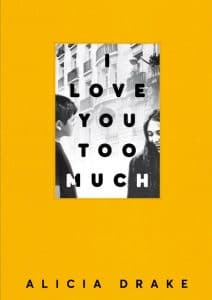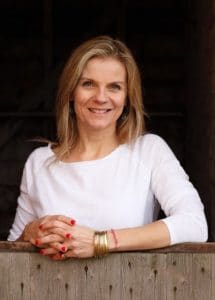Sam Bennett

The now UK-based Alicia Drake once resided in Paris. Her children’s preschool was on the other side of the Jardin du Luxembourg to where the family lived, so every day she’d walk back and forth across the Jardin, around which there are lots of senior schools and thus a lot of teenagers. The area is super-privileged, the writer says. “All parents want to buy an apartment there because they say it’s the dream upbringing for their children. And then you get there, and yes the Jardin du Luxembourg is very beautiful, but there are all these teenagers just kind of oscillating around in a lot of loneliness.”
She made notes about this loneliness, “the loneliness of childhood”. After two years of notetaking, she was sat at the family’s holiday home in Brittany, which they still visit every summer, and where she writes in a 1970s caravan situated in the garden. It’s here that she furthered the creation of Paul, the protagonist of her debut novel I Love You Too Much. “What if this story,” she wrote down, “is about a boy who is searching for unconditional love? What will he do if he can’t find it?”
Tough is one word the former journalist uses to describe the city in which her novel is set, where she spent 18 years of her life. “Paris is very demanding,” she states, claiming its inhabitants can’t just be who they are. “You have to be up to the standards of Paris, you have to be up to scratch. You have to make an effort every time you go out. If you go for dinner you have to be entertaining. You have to have seen the latest film, read the latest novel. It has the power to shape you, to change you – intellectually, aesthetically, taste-wise. It’s got a huge personality. It’s not anodyne. I love Paris, it’s fantastic, it’s inspiring, and it’s exciting. But it’s not nice, it’s not cosy. It’s not cosy at all.”
 I Love You Too Much takes place in the Sarkozy era, a period she calls narcissistic. “Paris and Parisians seemed so turned in on themselves,” she remarks of the time. Paris was at odds, she says, with the multicultural and open London; it was a very closed and archaic city in a way. It was also privileged, she resumes, “and the privileged people thought that they could keep reality outside, in the suburbs. It was like ‘us and them’, that was the kind of feeling within Paris.” This is what she’s trying to evoke with the novel and its characters: “this nonreality of their lives at that time”.
I Love You Too Much takes place in the Sarkozy era, a period she calls narcissistic. “Paris and Parisians seemed so turned in on themselves,” she remarks of the time. Paris was at odds, she says, with the multicultural and open London; it was a very closed and archaic city in a way. It was also privileged, she resumes, “and the privileged people thought that they could keep reality outside, in the suburbs. It was like ‘us and them’, that was the kind of feeling within Paris.” This is what she’s trying to evoke with the novel and its characters: “this nonreality of their lives at that time”.
She talks to me about the heavy inclusion of food in her “difficult book”. Paris is full of delicious food at the same time as being a place where there is extreme pressure on both males and females to be thin, she explains. She reverts back to the idea of Parisians having to meet the aesthetic demands of their home: “You have to live up to Paris with your silhouette.” But for her overweight protagonist, she resumes, food is his comfort, what he turns to in the absence of unconditional love. “French people are so self-disciplined, in having this food at their disposal, and yet never being excessive with it.” So she wanted to present a child, she says, for whom this excess is the only way of getting through the day.
The stage at which Paul starts to make himself physically sick is “when the waters have broken, he can’t cope anymore with what he’s trying to hold up. Not even food can bring him solace at that point.” And that’s when, I comment, she starts describing the food itself in quite unappealing ways (earlier in the novel she manages to make white rice with ketchup, something I don’t think I could bring myself to eat, sound like a tasty treat). “Exactly,” she says. “By the end [the food is] a symbol of hurt as well, this unbearable hurt that he’s living with.”
Paul’s mother Séverine might be considered cold at times towards her son. Drake, a mum of five herself, cites the difference between motherhood in Paris and in the UK. It’s “incredibly sentimental” over here, whereas it isn’t in France’s capital. “[Parisians] can be – and they are – wonderful mothers, so I’m not criticising their approach to motherhood, but they don’t seem to be bogged down by guilt, which is a big feature of British motherhood.” UK mums worry they’re not doing right by their kids, she continues, that they’re not good enough – Parisian mums don’t question themselves like this.
She later asks me what I thought of the book. I tell her I enjoyed it, but then wonder out loud whether enjoy is the right expression. “I know it’s painful,” she says almost apologetically. “I think being a child is painful, and growing up is painful. Two of her children have read I Love You Too Much – what did they think? “What was great is that they found it totally credible. That for me was really important.” They believed Paul, I’m told, and the character of Scarlett – his unlikely friend. “That’s what I needed to hear from them.”
I Love You Too Much publishes 8 February. panmacmillan.com

